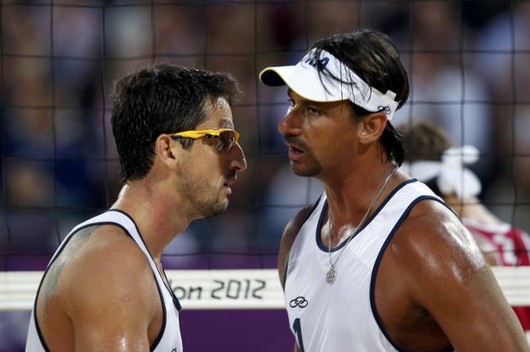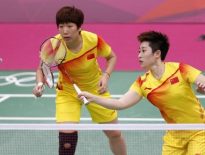By Estelle Shirbon
LONDON, Aug 2 (Reuters) – In their heyday, Brazilians Emanuel Rego and Ricardo Santos were the most successful men’s beach volleyball pair in the world, winning every available trophy including Olympic gold in Athens in 2004. At the London Games, they are rivals.

Both men have teamed up with younger players and the two new pairs are both strong contenders for medals, setting up an intriguing contest against a backdrop of tangled relationships going back more than a decade.
Emanuel, who at 39 is competing in his fifth Olympics, is playing with first-time Olympian Alison Cerutti. The pair have swept all before them since coming together three years ago and are world champions.
Ricardo, 37 and in his fourth Olympics, is playing with Olympic newcomer Pedro Cunha, 29. They have only been together for a year and have not made as dramatic an impact as Emanuel and Alison, but they have already won several trophies.
Both pairs have won all three of their pool matches to come top of their groups. The knockout phase begins on Friday.
So how do Emanuel and Ricardo feel about the prospect of playing against each other?
“I don’t want to think about it,” Emanuel told Reuters.
A sport played only in pairs and involving tactical decisions to be made in a split second, beach volleyball requires very strong chemistry between the players.
Emanuel described his relationship with Ricardo as similar to that of two very competitive siblings.
“He is my brother, but now we are not so close,” he said. “We are both very competitive so we are focused on our teams.”
Watching the two pairs in action on the sand in London, it is clear that both Emanuel and Ricardo have paired up with younger versions of each other.
“BECAUSE OF A WOMAN”
The sinewy Emanuel, a cerebral player who constantly confuses his opponents with imaginative tactics, is a perfect match for the beefy Alison, 2.03 metres tall, a wall of a man capable of blocking the most powerful spikes.
Ricardo, 2 metres tall and with biceps to make any body-builder proud, has found his ideal partner in Cunha, a smaller player with a spring in his step and a quick mind.
Emanuel and Ricardo always speak of each other with respect and when asked if they are still friends they both say yes.
But Cunha said he had the impression the two men were no longer that comfortable in each other’s presence. He said Ricardo was a shy and sensitive man and it was better not to talk about Emanuel with him.
“I don’t even ask,” said Cunha. “It’s between them.”
Ricardo and Emanuel played together for almost eight years, during which they mostly dominated the sport. After their gold in Athens, they also won bronze in Beijing in 2008.
Asked why they split up, Ricardo gave a chuckle and said: “Because of a woman.”
The two had long been based in Joao Pessoa, in the northeastern Brazilian state of Paraiba. But in 2008 Emanuel got married and he and his wife decided to move to Rio de Janeiro, hundreds of miles to the south.
“That was one of the reasons why I quit my partnership with Ricardo. At that moment I was thinking ah, I was so selfish to play just volleyball, volleyball, volleyball. Now I want to think about my family,” said Emanuel.
There were other reasons too, of course. Speaking through a Portuguese-English interpreter, Ricardo said the pair had set the bar so high that they had run out of goals.
“When I played with Emanuel we were a very strong team. It was the most successful in history and we left a mark. We have many memories together,” commented Ricardo, whose soft, melodic voice contrasts with his huge physical presence.
FAMILY TREE
Swapping partners and competing against former team mates is not unheard of in beach volleyball.
Five-time Olympian Natalie Cook of Australia won gold with Kerri Pottharst in Sydney in 2000 only to compete against her in Athens. Cook and Pottharst remain friends.
Latvia’s Aleksandrs Samoilovs and Martins Plavins caused a sensation in Beijing by upsetting the eventual gold medal winners, Americans Todd Rogers and Phil Dalhausser. The Latvians are competing in London, but this time with different partners.
In Brazil though, the world of high-level men’s beach volleyball looks like a particularly complicated family tree.
Emanuel made his Olympic debut in Atlanta in 1996 alongside Ze Marco de Melo and competed again in Sydney in 2000 with Jose Loiola. Then came the Ricardo years and two Olympic medals.
For his part, Ricardo played his first Olympics with Ze Marco, Emanuel’s former partner, in Sydney. The pair won silver, meaning that Ricardo has three Olympic medals from three Games so far, while Emanuel has two medals from four Games.
To complicate matters, the younger partners in the London pairs, Cunha and Alison, also played together in the past. In 2003, Alison won his first tournament playing with Cunha and the two still enjoy warm relations.
Cunha said beach volleyball partnerships were emotionally intense but there were benefits to all the swapping around.
“It’s like any other relationship. You get tired, you fight, you have problems like anyone else,” he said.
“But it’s not like a marriage. In sport, when it’s over you just look for someone else who will be better for you. That’s why sometimes we change partners. That’s part of the magic of the sport, to mix the teams and the players.”
But what is it like for the younger men to play alongside athletes as illustrious as Emanuel or Ricardo?
“It’s a lot of pressure for me,” said Cunha.
“I don’t want to be the only player that didn’t give him a medal. But it’s a good pressure, it helps me to focus on our goal. I think it made me work more and more to get ready for this Olympics.” (Editing by Mark Meadows)





